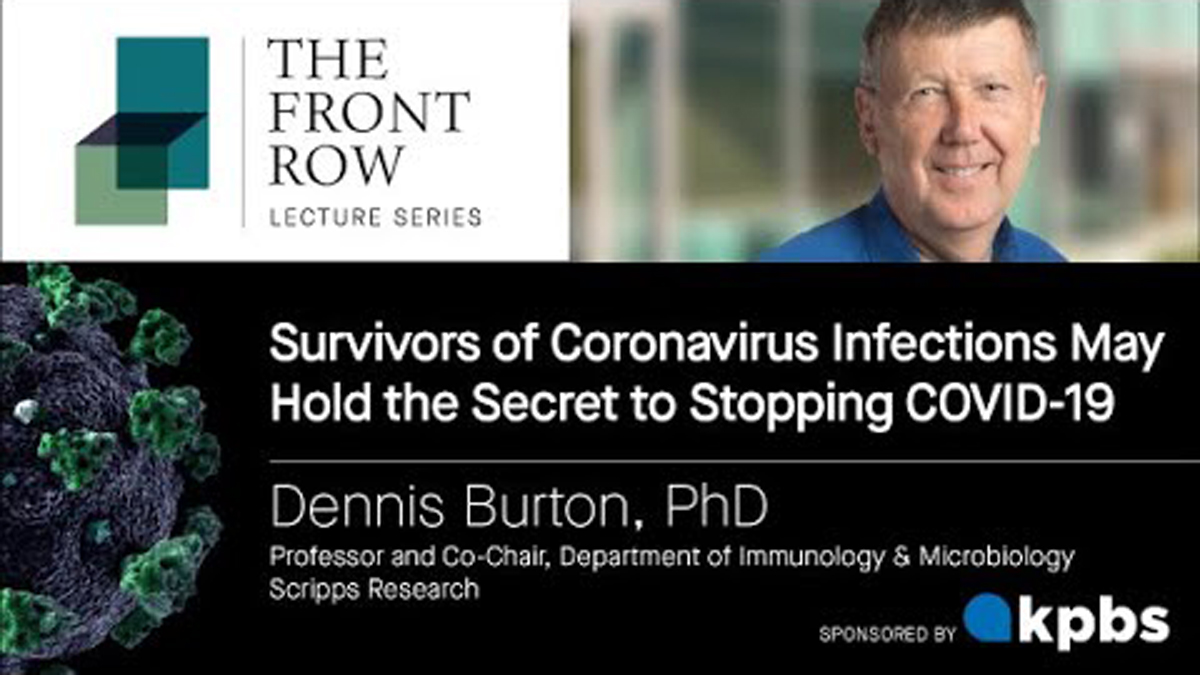Mapping Weak Spots on the New Coronavirus: Nanoscale Discoveries Drive Vaccine Development
June 17, 2020
Understanding the precise structure of a newly emerged virus—such as the SARS-CoV-2 virus at the root of COVID-19—is a critical first step in creating a vaccine. In this Front Row lecture, Scripps Research structural biologist Andrew Ward, PhD, shares how a revolutionary technique known as cryo-electron microscopy is generating powerful 3-D images of the coronavirus and its interactions with the human immune system, unearthing discoveries that are already shaping the future of medicine.
How We Can Tackle the COVID-19 Crisis Beyond Testing
June 3, 2020
If you wear a smartwatch or fitness tracker, you can play a role in monitoring the spread of COVID-19 and other viral diseases like the flu. In this Front Row lecture, Eric Topol, MD, and Jennifer Radin, PhD, discuss how they’re calling on the public to share data from wearable devices for a study that’s helping scientists flag the early onset of contagious respiratory illnesses. By harnessing this key data—including heart rates, sleep and activity levels—from hundreds of thousands of individuals, they seek to improve real-time disease surveillance.
Survivors of Coronavirus Infections May Hold the Secret to Stopping COVID-19
May 20, 2020
Soon after the COVID-19 pandemic reached the United States, a team of Scripps Research scientists began studying blood samples from patients recovering from infection by the novel coronavirus. In this virtual Front Row lecture, Dennis Burton, PhD, shared how he and his collaborators are analyzing COVID-19 survivors’ blood for proteins, known as antibodies, that the immune system creates after encountering the virus. Antibodies to the new coronavirus could be used as much-needed therapeutics to COVID-19 or to help design a vaccine to protect against the disease.
Leveraging the World’s Leading Drug Repurposing Collection Against COVID-19
May 6, 2020
In the weeks and months after the novel coronavirus emerged, Calibr at Scripps Research transformed into an international hub for COVID-19 drug discovery. In this Front Row lecture, Arnab Chatterjee, PhD, shares how Calibr scientists and their many collaborators are leveraging a unique resource—the ReFRAME drug repurposing collection—to help identify safe antiviral drugs that can be rapidly advanced to patients. Learn why Calibr was especially well poised to meet the COVID
Addressing the Coronavirus Challenge
April 22, 2020
How do scientists create vaccines and drugs against a virus that simply didn’t exist months ago? That’s the challenge that virologist Michael Farzan, PhD, is facing head on—along with his team on the Jupiter, Florida, campus of Scripps Research. In this Front Row lecture, Farzan, a professor and co-chair of the Department of Immunology and Microbiology, shares his early findings on efforts to develop a safe and effective vaccine that triggers antibodies against the novel coronavirus.
Outsmarting Emerging Pathogens in an Interconnected World
April 15, 2020
At the beginning of the COVID-19 pandemic, Kristian Andersen, PhD, a genomic epidemiologist, was one of the first to begin tracing the origins and spread of the novel coronavirus based on public genome sequencing data. In this virtual Front Row lecture, Andersen will share unique insights on how the COVID-19 pandemic emerged and spread around the world, as well as what science tells us has worked and not worked to mitigate the public health crisis. He’ll discuss how the lessons learned from the current pandemic and other infectious disease epidemics can help us prepare for future outbreaks.





